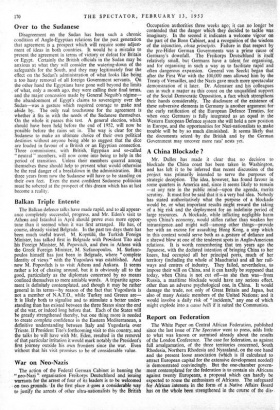Balkan Triple Entente
The Balkan defence talks have made rapid, and to all appear- ance completely successful, progress, and Mr. Eden's visit to Athens and Istanbul in April should prove even more oppor- tune than it seemed when it was first arranged. He has, of course, already visited Belgrade. In the past ten days there has been much useful travel. M. Koprtilii, the Turkish Foreign Minister, has talked first in Belgrade with President Tito and his Foreign Minister, M. Popovitch, and then, in Athens with the Greek Foreign Minister, M. Stefanopoulos. M. Stefano- poulos himself has just been in Belgrade, where " complete identity of vievo " with the Yugoslays was established. And now M. Popovitch is to visit Athens and Ankara. It seems rather a lot of chasing around, but it is obviously all to the good, particularly as the diplomats concerned by no means confined themselves to mere amiable words. A tripartite agree- ment is definitely contemplated, and though it may be rather general in its terms—by reason of the fact that Yugoslavia is not a member of N.A.T.O., while Turkey and Greece are-- it is likely both to signalise and to stimulate a better under- standing than has existed between the three States since the end of the war, or indeed long before that. Each of the States will be greatly strengthened thereby, but one thing more is needed to create complete confidence in the Eastern Mediterranean, a definitive understanding between Italy and Yugoslavia over Trieste. If President Tito's forthcoming visit to this country, and the talks he will have with Mr. Eden, resulted in the removal of that particular irritation it would mark notably the President's first journey outside his own frontiers since the war. Even without that his visit promises to be of considerable value.


































 Previous page
Previous page